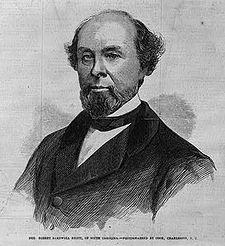Miss Claudine Rhett describes the glorious autumn of 1860 in Charleston, leading up to South Carolina’s declaration of independence.
I was In Charleston all through the autumn and winter of 1860-61, when so much agitation preceded secession. The very air seemed to be charged with electricity by the approaching storm of contest. You could not walk more than a few steps down any thoroughfare with- out meeting young men wearing conspicuously on their breasts blue cockades or strips of plaited palmetto fastened to their button-holes, which attested that they were “minute men,” all ready for duty. Flags fluttered in every direction, and the adjacent islands were converted into camping-grounds. Companies drilled and paraded daily on every open square in the city, and bands of music nightly serenaded distinguished men, and made the old houses echo back the strains of “Dixie” and the “Marseillaise.”
In December South Carolina seceded from the Union, and I shall never forget the evening that the Ordinance of Secession was signed, by the Delegates of each District of the State, at the large Institute Hall, on Meeting street, which was afterwards burnt in the great fire. The scene was one of extraordinary impressiveness. and the enthusiasm and excitement spirit-stirring. There was scarcely standing room in the big hall for the eager crowd of witnesses, and the galleries were packed with ladies. As the Districts were called out in turn by Mr. Jamison, the chairman of the convention, and the delegates one by one went up on the platform and signed the Ordinance, the cheering was vehement, and the ladies waved their handkerchiefs in token of approval.
Never was an act performed with more unanimity, and never did one meet with more general and hearty approbation. It has become the fashion now to say that none of us wished to secede, and that the State was made to withdraw from the Union by one or two politicians, without the knowledge or consent of the people. This statement is most assuredly an incorrect one, for not a member of the large convention refused his signature to the Ordinance, and no voice was raised that night, save in acclamation. No one living in Charleston, then, can say that he was ignorant of what took place and of the public acquiesence in the deed, unless he was blind and deaf and dumb.
1) This is from Claudine Rhett’s “Old Confederate Days” published in Our Women in the War, The News and Courier Book Presses, Charleston, S.C., 1885. Google has an online copy. I knew about this piece because I read it in Richard Wheeler’s A Rising Thunder, Castle Books, Edison, N.J. 2006 (pp. 23-24)
2) Seven Score and Ten has a good piece on the irony of South Carolinians singing the Marseillaise. You can listen to it at YouTube. I did not know which song it was – oh, it’s that song.
3) Claudine was the daughter of well-known fire-eater Robert Barnwell Rhett, Sr. There’s something about the Rhetts I kind of like. From the perspective of 150 years it’s easy to dislike their pro-slavery politics, but they weren’t afraid to wear their hearts and their politics (and maybe a blue cockade) on their sleeves. Claudine says don’t let anyone fool you – we were all for secession. Based on this biography of Rhett, Sr.I think Claudine would have been about 14 years old when she proudly watched her father sign the secession proclamation. As of 1897 Claudine was the historian of the Charleston chapter of the United Daughters of the Confederacy based on these minutes. Claudine’s brother, Robert, Jr. was editor of the Charleston Mercury, which seemed to be strongly pro-secession. You can read the Mercury’s coverage of the events of December 20, 1860 here


Pingback: Mercury Still Fanning the Flames | Blue Gray Review